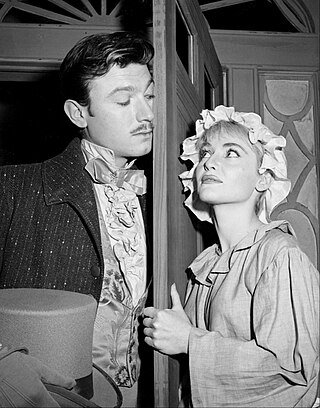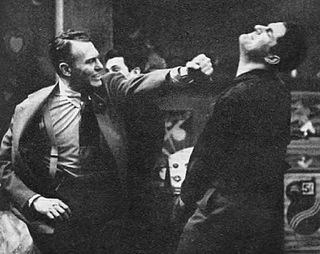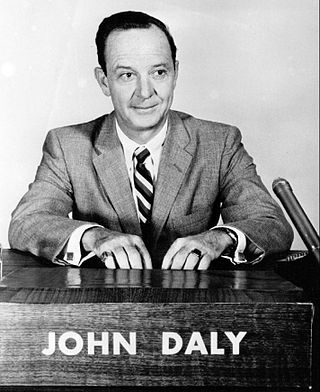Related Research Articles

Armstrong Circle Theatre is an American anthology drama television series which ran from June 6, 1950, to June 25, 1957, on NBC, and from October 2, 1957, to August 28, 1963, on CBS. It alternated weekly with The U.S. Steel Hour. It finished in the Nielsen ratings at number 19 for the 1950–51 season and number 24 for 1951–52. The principal sponsor was Armstrong World Industries.

Lux Video Theatre is an American television anthology series that was produced from 1950 until 1957. The series presented both comedy and drama in original teleplays, as well as abridged adaptations of films and plays.

The First Hundred Years was the first ongoing TV soap opera in the United States that began as a daytime serial, airing on CBS from December 4, 1950 until June 27, 1952.

The Alcoa Hour is an American anthology television series sponsored by the Alcoa Corporation that aired live on NBC from October 16, 1955, to September 22, 1957.

Ford Theatre, spelled Ford Theater for the original radio version and known, in full, as The Ford Television Theatre for the TV version, is a radio and television anthology series broadcast in the United States in the 1940s and 1950s. At various times the television series appeared on all three major television networks, while the radio version was broadcast on two separate networks and on two separate coasts. Ford Theatre was named for its sponsor, the Ford Motor Company, which had an earlier success with its concert music series, The Ford Sunday Evening Hour (1934–42).
They Stand Accused is an American dramatized court show broadcast on the now-defunct DuMont Television Network from September 11, 1949, to October 5, 1952 and again from September 9 to December 30, 1954.
Crawford Mystery Theatre is an American television program broadcast on the DuMont Television Network Thursdays at 9:30pm ET beginning on September 6, 1951. The series was also seen in first-run syndication. The series ran from 1951 to 1952.

Man Against Crime starring Ralph Bellamy, one of the first television programs about private eyes, ran on CBS, the DuMont Television Network and NBC from October 7, 1949, to June 27, 1954, and was briefly revived, starring Frank Lovejoy, during 1956. The show was created by Lawrence Klee and was broadcast live until 1952. The series was one of the few television programs ever to have been simulcast on more than one network: the program aired on both NBC and DuMont during the 1953–54 television season.
Paul Whiteman's Goodyear Revue is an American television variety series. The show aired on ABC on Sunday evenings from November 6, 1949, through March 30, 1952 hosted by Paul Whiteman.

The Bigelow Theatre is an American anthology series originally broadcast on CBS Television and on the DuMont Television Network.

It's News to Me is an American panel game show produced by Mark Goodson and Bill Todman for CBS Television. It was a derivative of Goodson-Todman's own panel show What's My Line?. Originally aired as a one-time special on May 11, 1951; It debuted as a series July 2, 1951, to August 27, 1954.
Gruen Playhouse is an American dramatic anthology series that was known as Gruen Guild Playhouse when it debuted on ABC on September 27, 1951. "Guild" was dropped from the title when it was shown on the DuMont Television Network from January 17, 1952, until July 3, 1952.

The Ford Show is an American variety program starring singer and folk humorist Tennessee Ernie Ford, which aired on NBC on Thursday evenings from October 4, 1956, to June 29, 1961. The show was sponsored by the Ford Motor Company, whose founders shared a last name with the host but had no known relation.
Meet the Boss was an American series broadcast on the DuMont Television Network from June 10, 1952, to May 12, 1953. The series was hosted initially by Bill Cunningham. Marshall McNeil replaced Cunningham on October 7, 1952. Robert Sullivan also hosted the show.
Faye Emerson's Wonderful Town, also known as Wonderful Town, USA, is a half-hour variety television series that aired on CBS from June 16, 1951, to April 19, 1952, in which Faye Emerson visits various cities. Episodes of the program were also shown to American military personnel overseas via Kinescope.
The Front Page is an American newspaper drama television series, broadcast on CBS beginning September 29, 1949, and ending on January 26, 1950. The stars were John Daly and Mark Roberts, with Richard Boone, Curt Conway and Janet Shaw. The live 30-minute show, based on the 1928 play The Front Page by Charles MacArthur and Ben Hecht, aired Thursdays at 8pm ET.

Oh! Those Bells is a 1962 United States sitcom television series starring The Wiere Brothers about the misadventures of three brothers who work in a Hollywood theatrical supply shop. It aired from March 8 to May 31, 1962.
The Man and the Challenge is an American adventure fiction television series about a scientist who tests problems of human survival. It stars George Nader and aired on NBC during the 1959–60 television season.
This Is Show Business is an American variety television program that was broadcast first on CBS and later on NBC beginning July 15, 1949, and ending September 11, 1956. It was CBS-TV's first regular series broadcast live from coast to coast. It was originally titled This Is Broadway.
Hollywood Opening Night is an American anthology television program that was broadcast on CBS in 1951-1952 and on NBC in 1952-1953. The NBC version was the first dramatic anthology presented live from the West Coast. Episodes were 30 minutes long.
References
- ↑ McNeil, Alex (1996). Total Television: the Comprehensive Guide to Programming from 1948 to the Present (4th ed.). New York, New York: Penguin Books USA, Inc. p. 296. ISBN 0-14-02-4916-8.
- ↑ Brooks, Tim; Marsh, Earle (2007). "Ford Theatre". The Complete Directory to Prime Time Network and Cable TV Shows 1946–Present (9 ed.). New York: Random House Publishing. p. 491. ISBN 978-0-345-49773-4 . Retrieved 2024-06-02.
- 1 2 3 Brooks, Tim; Marsh, Earle (2007). "Ford Festival". The Complete Directory to Prime Time Network and Cable TV Shows 1946–Present (9 ed.). New York: Random House Publishing. p. 490. ISBN 978-0-345-49773-4 . Retrieved 2024-06-02.
- 1 2 "Thursday August 30". Ross Reports. August 24, 1951. p. 9. Retrieved July 24, 2024.
- ↑ Crossland, Ken; Macfarlane, Malcolm (August 29, 2013). Late Life Jazz: The Life and Career of Rosemary Clooney. Oxford University Press USA. p. 228. ISBN 978-0-19-979857-5 . Retrieved July 23, 2024.
- ↑ Youngkin, Stephen (September 30, 2005). The Lost One: A Life of Peter Lorre. University Press of Kentucky. p. 487. ISBN 978-0-8131-7185-2 . Retrieved July 23, 2024.
- 1 2 "Thursday September 27 (Cont'd)". Ross Reports. September 23, 1951. p. 7. Retrieved July 24, 2024.
- ↑ "Thursday September 6". Ross Reports. August 31, 1951. p. 11. Retrieved July 24, 2024.
- 1 2 Gould, Jack (April 6, 1951). "Television in Review: James Melton Unveils His Own Video Program, 'Ford Festival,' Hour-Long Show, on Channel 9" . The New York Times. p. 32. Retrieved July 23, 2024.